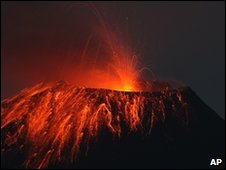 Thousands of people have been forced to flee their homes as two volcanos erupted in Guatemala and Ecuador.
Thousands of people have been forced to flee their homes as two volcanos erupted in Guatemala and Ecuador.
In Guatemala, the Pacaya volcano began spewing lava, rocks and debris on Thursday, killing at least two people and injuring more than 50 others.
In Ecuador, the Tungurahua volcano forced the evacuation of seven villages and shut the airport and schools in Guayaquil, the country's largest city.
There is no suggestion the upsurge in volcanic activity is related.
In Guatemala, at least 1,700 people have fled the eruption, some 30km (19 miles) south of the capital city.
President Alvaro Colom has declared a state of emergency in Escuintla region, Guatemala City and areas surrounding the capital.
He said two people had died and three children were missing.
One man was killed when he fell from a building while sweeping up the ash. A TV reporter also died while covering the eruption.
In the village of Calderas, close to the eruption, Brenda Castaneda said her family hid under furniture as molten rocks fell on her house.
"We thought we wouldn't survive. Our houses crumbled and we've lost everything," she told the Associated Press from a temporary shelter.
The volcano has covered parts of Guatemala City in ash - up to 7cm (2.7in) thick in some areas - forcing the closure of the country's main international airport.
Seismologists have warned of more eruptions "in the coming days" from Pacaya - one of the most active volcanos in Central America.
Health concerns
In Ecuador, the Tungurahua volcano sent ash plumes six miles (10km) into the air.
Several thousand people have evacuated their homes in the area, 95 miles (150km) south-east of the capital Quito.
Strong winds blew the ash over the country's most populous city, Guayaquil, and forced aviation officials to close the country's main airport.
Julio Castro, who lives in Guayaquil, said he was worried about the health of children.
"Suddenly, without warning, the ash started to fall, and it was heavy, some even got into my eyes," he told the Associated Press.
"I can't see well now, it is annoying and we are worried for the children, above all."
There were reports that the ash cloud was dissipating as it drifted out over the Pacific Ocean.



